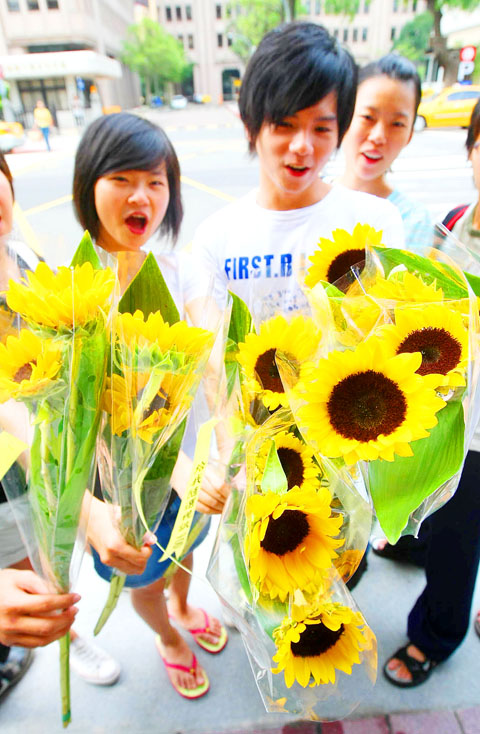Several Chinese Nationalist Party (KMT) legislators yesterday questioned the impartiality of a legislative watchdog after the organization gave them the worst reviews among all legislators from the organization.
KMT Legislator Tsai Chin-lung (蔡錦隆), who ranked bottom among members of the Home and Nations Committee in a review by Citizen Congress Watch (CCW), expressed doubts about the evaluation criteria.
“I was voted the worst [in the committee] only because I did not sign a CCW agreement [to push sunshine bills],” he said.

PHOTO: CNA
KMT Legislator Tsao Erh-chang (曹爾忠), who was considered by the CCW to have the worst performance among Transportation Committee members, accused the organization of disregarding his explanation on several occasions that his attendance record was seriously affected by the poor weather of Matsu.
KMT Legislator Chiu Yi (邱毅), who ranked lowest among members of the Judiciary and Organic Law and Statutes Committee, said the CCW was politically biased.
“This organization is pro-green. It is trying to protect [former president] Chen [Shui-bian (陳水扁)]. Of course it dislikes me,” Chiu said when asked for comment.
Chiu later filed a defamation lawsuit against CCW chairman Ku Chung-hwa (顧忠華) and board member Chen Ming-li (陳明理), saying that they “failed to rationally and reasonably supervise [the legislature],” but criticized “elected representatives who do not share their political views.”
The CCW publicized its evaluation of legislators on Sunday after some 100 evaluators, including academics, journalists, representatives from non-governmental organizations, businesspeople and students assessed lawmakers in accordance with their attendance record, how often they spoke at legislative meetings or whether they had signed an agreement to improve legislative transparency.
Seven KMT legislators, including Tsai, Tsao, Chiu, Hung Hsiu-chu (洪秀柱), Fu Kun-chi (傅崑萁), Chang Chia-chun (張嘉郡) and Hsu Shao-ping (徐少萍) and Non-Partisan Solidarity Union Legislator Lin Ping-kun (林炳坤) were considered to have been the worst performers.
None of the 27 Democratic Progressive Party legislators was ranked lower.
KMT caucus secretary-general Chang Sho-wen (張碩文) condemned the CCW, saying KMT lawmakers who received poor reviews had performed well in terms of their bills, budget reviews and service to voters in their electoral districts.
The CCW held a press conference yesterday afternoon in response to the criticism.
While apologizing to Chiu for failing to include his endorsement of the legislative transparency agreement when tallying Chiu’s score, which meant Chiu should have ranked ninth in the Judiciary and Organic Law and Statutes Committee, CCW secretary-general Ho Tsung-hsun (何宗勳) defended the standards adopted in making the evaluation.
Ho said review criteria came from many sources, such as official statistics on the legislature’s Web site, media reports and data provided by lawmakers.
A reviewer who wished to remain anonymous rebutted Chiu’s claim that the CCW was trying to protect the former president.
“We started collecting data for the review several months ago ... before Chen [Shui-bian] was suspected of money laundering,” he said.

Nipah virus infection is to be officially listed as a category 5 notifiable infectious disease in Taiwan in March, while clinical treatment guidelines are being formulated, the Centers for Disease Control (CDC) said yesterday. With Nipah infections being reported in other countries and considering its relatively high fatality rate, the centers on Jan. 16 announced that it would be listed as a notifiable infectious disease to bolster the nation’s systematic early warning system and increase public awareness, the CDC said. Bangladesh reported four fatal cases last year in separate districts, with three linked to raw date palm sap consumption, CDC Epidemic Intelligence

The manufacture of the remaining 28 M1A2T Abrams tanks Taiwan purchased from the US has recently been completed, and they are expected to be delivered within the next one to two months, a source said yesterday. The Ministry of National Defense is arranging cargo ships to transport the tanks to Taiwan as soon as possible, said the source, who is familiar with the matter. The estimated arrival time ranges from late this month to early next month, the source said. The 28 Abrams tanks make up the third and final batch of a total of 108 tanks, valued at about NT$40.5 billion

Two Taiwanese prosecutors were questioned by Chinese security personnel at their hotel during a trip to China’s Henan Province this month, the Mainland Affairs Council (MAC) said yesterday. The officers had personal information on the prosecutors, including “when they were assigned to their posts, their work locations and job titles,” MAC Deputy Minister and spokesman Liang Wen-chieh (梁文傑) said. On top of asking about their agencies and positions, the officers also questioned the prosecutors about the Cross-Strait Joint Crime-Fighting and Judicial Mutual Assistance Agreement, a pact that serves as the framework for Taiwan-China cooperation on combating crime and providing judicial assistance, Liang

A group from the Taiwanese Designers in Australia association yesterday represented Taiwan at the Midsumma Pride March in Melbourne. The march, held in the St. Kilda suburb, is the city’s largest LGBTQIA+ parade and the flagship event of the annual Midsumma Festival. It attracted more than 45,000 spectators who supported the 400 groups and 10,000 marchers that participated this year, the association said. Taiwanese Designers said they organized a team to march for Taiwan this year, joining politicians, government agencies, professionals and community organizations in showing support for LGBTQIA+ people and diverse communities. As the first country in Asia to legalize same-sex